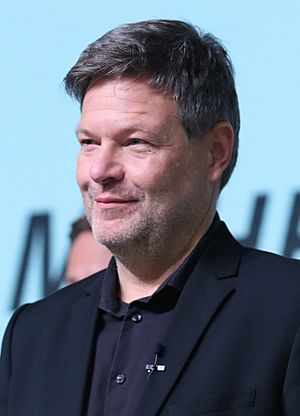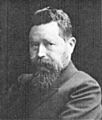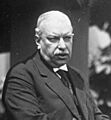Vice-Chancellor of Germany facts for kids
Quick facts for kids Deputy to the Federal Chancellor of the Federal Republic of Germany |
|
|---|---|

Coat of arms of the German Government
|
|
| Style | Mr. Vice-Chancellor (informal) His Excellency (diplomatic) |
| Member of | Federal Cabinet |
| Seat | As Federal Minister; currently Federal Ministry for Economic Affairs and Climate Action, Berlin/Bonn |
| Nominator | Chancellor of Germany or the coalition party |
| Appointer | Chancellor of Germany |
| Term length | At the Chancellor's pleasure |
| Constituting instrument | German Basic Law (German Constitution) |
| Formation | 24 May 1949 |
| First holder | Franz Blücher |
The Vice-Chancellor of Germany is the second most important member of the German government. The Chancellor is the head of the government. The Chancellor chooses one of the federal ministers to be their deputy. Usually, this title goes to a main minister from the smaller party in the government's coalition.
In daily politics, being a Vice-Chancellor is mostly an honorary title. The Vice-Chancellor can lead cabinet meetings if the Chancellor is away. The main job of the Vice-Chancellor is to take over the Chancellor's duties if the Chancellor cannot do their job. This has never actually happened in the history of the Federal Republic of Germany.
If a Chancellor resigns, dies, or can no longer do their job, the Vice-Chancellor does not automatically become the next Chancellor. In such a case, the Federal President chooses a minister to act as Chancellor. This acting Chancellor stays in office until the Bundestag (the German parliament) elects a new Chancellor.
Even though the official term is Deputy to the Federal Chancellor (German: Stellvertreter des Bundeskanzlers), most Germans call this person the Vice-Chancellor (German: Vizekanzler). The term Chancellor (German: Kanzler) has been used for the German head of government since 1867. The idea of a general deputy was created by a law in 1878. The current office has existed since Germany's constitution was written in 1949.
The current Vice-Chancellor of Germany is Robert Habeck. He started his job on 8 December 2021. He took over from Olaf Scholz, who became Chancellor.
Contents
History of the Vice-Chancellor Role
Early Beginnings: German Empire
The role of a deputy to the Chancellor first started in 1878. A law allowed the imperial chancellor to choose a deputy. This person was officially called the General Deputy to the Imperial Chancellor. The Chancellor could also choose other deputies for specific tasks. Later, in 1918, this law was changed. The Vice-Chancellor was then given the right to speak in parliament.
Weimar Republic: A Less Important Role
During the Weimar Republic (1919–1933), the Vice-Chancellor's job was seen as less important. It wasn't even mentioned in the constitution. Often, the Minister of Justice or the Minister of the Interior held this position. One well-known person who held this job was Franz von Papen. He was a former Chancellor who joined a government with Adolf Hitler. Hitler became Chancellor, and Papen became Vice-Chancellor. However, it quickly became clear that the Vice-Chancellor position had no real power. It could not control Hitler.
Modern Germany: Federal Republic
Since 1949, in the Federal Republic of Germany, Chancellors have not wanted their deputies to use the title for their own fame. Since 1966, it became common for the main partner in the government coalition to get the job of Foreign Minister. This person was also usually appointed as the Deputy to the Chancellor. The Foreign Ministry was seen as the most important job after the Chancellor. This tradition changed a bit during Angela Merkel's time as Chancellor. This was partly because important politicians from the coalition partner chose different ministries based on what they preferred.
How the Vice-Chancellor is Chosen
The German Cabinet and Appointments
The German government, called the cabinet, includes the Chancellor and the Federal Ministers. According to Germany's main law, the Basic Law (Article 69.1), the Chancellor chooses one of the ministers to be the Vice-Chancellor. The President does not need to formally approve this choice. It is entirely up to the Chancellor.
Coalition Governments and the Choice
Even though the Chancellor can theoretically pick anyone, in reality, German governments are usually made up of two or more political parties working together. In these cases, the Chancellor usually gives the Vice-Chancellor title to a minister from the second-largest party in the coalition. This is often done based on what that party's leaders suggest.
Vice-Chancellor vs. Vice President
The German Vice-Chancellor is similar to a deputy prime minister in other countries. However, it is different from a Vice President in countries like the United States. A German Vice-Chancellor does not automatically become the next Chancellor if the current Chancellor suddenly leaves office.
What Happens if the Chancellor Leaves Office?
A German cabinet only exists as long as the current Chancellor is in office. If a Chancellor's term ends (because they die, resign, or a new parliament meets), all ministers' jobs automatically end. If this happens, the President of Germany chooses someone to be the Acting Chancellor. This person is usually one of the former cabinet ministers, and often it's the former Vice-Chancellor. They serve until the parliament elects a new Chancellor. For example, when Chancellor Willy Brandt resigned in 1974, President Gustav Heinemann appointed the former Vice-Chancellor Walter Scheel as Acting Chancellor.
If both the Chancellor and the Vice-Chancellor are unable to do their jobs, the Basic Law does not say who should take over. However, the rules for German cabinet meetings state that if both are absent, a cabinet member chosen by the Chancellor or Vice-Chancellor will lead the meeting. If no one was chosen, the cabinet member who has been in the government the longest will lead.
Images for kids
See also
 In Spanish: Vicecanciller de Alemania para niños
In Spanish: Vicecanciller de Alemania para niños
 | William M. Jackson |
 | Juan E. Gilbert |
 | Neil deGrasse Tyson |







































